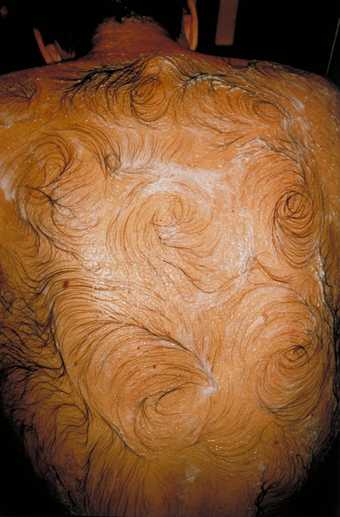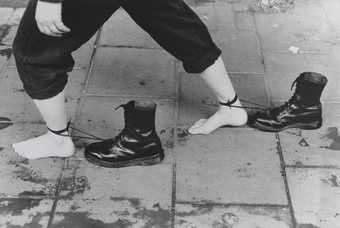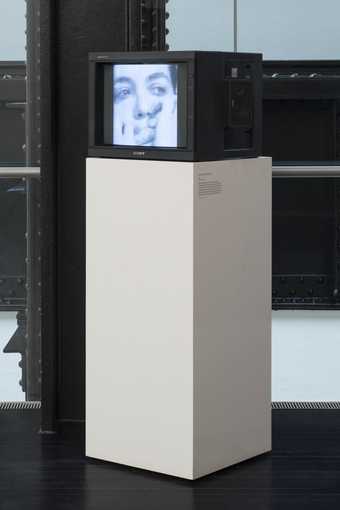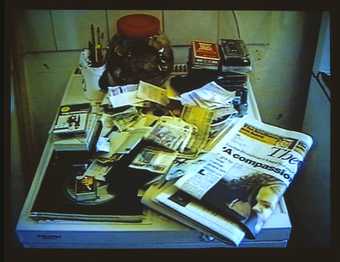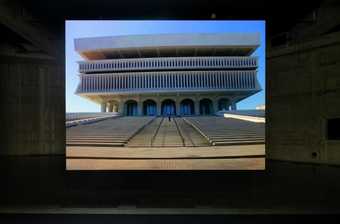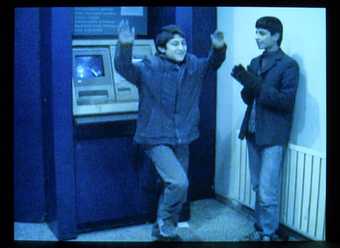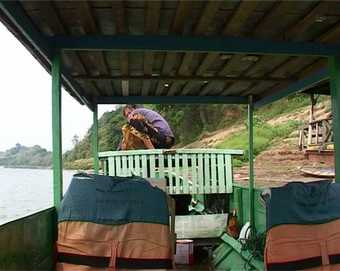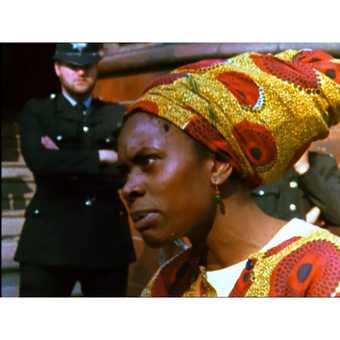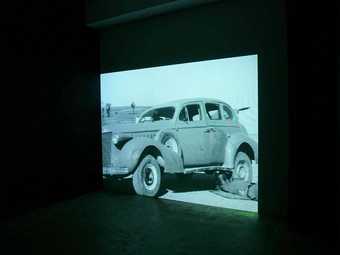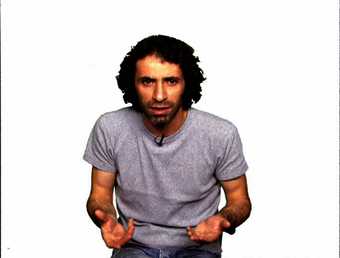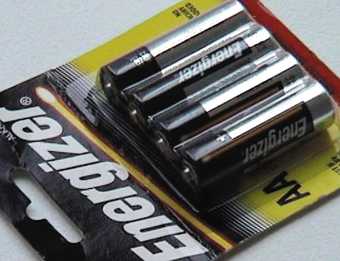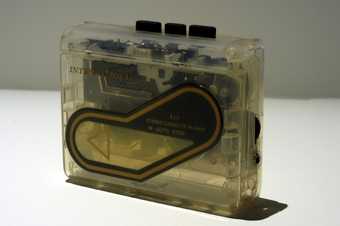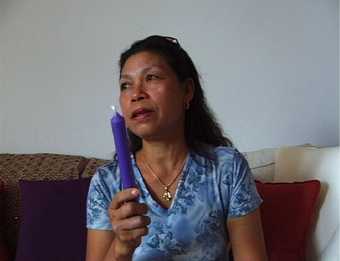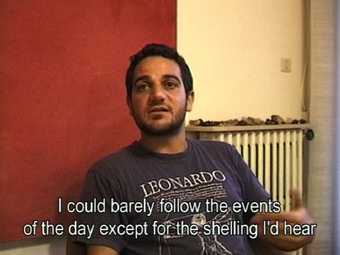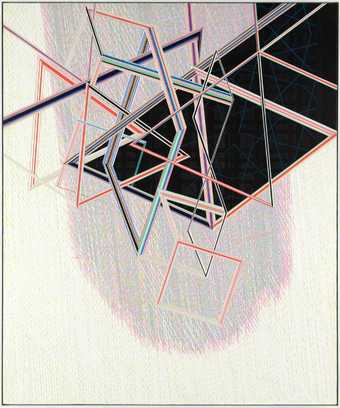In Tate Liverpool
- Artist
- Mona Hatoum born 1952
- Medium
- Video, projection, colour and sound (mono)
- Dimensions
- Collection
- Tate
- Acquisition
- Purchased 1999
- Reference
- T07538
Summary
Measures of Distance is a video work comprising several layered elements. Letters written by Hatoum's mother in Beirut to her daughter in London appear as Arabic text moving over the screen and are read aloud in English by Hatoum. The background images are slides of Hatoum's mother in the shower, taken by the artist during a visit to Lebanon. Taped conversations in Arabic between mother and daughter, in which her mother speaks openly about her feelings, her sexuality and her husband's objections to Hatoum's intimate observation of her mother's naked body are intercut with Hatoum's voice in English reading the letters.
Hatoum was born in Beirut to Palestinian parents and became an exile in Britain, during a short visit to London, when war broke out in Lebanon in 1975. She attended art schools in London (Byam Shaw School of Art 1975-9, Slade School of Art 1979-81), where her experience of cultural displacement, both as a woman and an Arab national, informed much of her practice. She made Measures of Distance in Vancouver during a year as artist-in-residence at Western Front Art Centre. It is a Western Front production. Hatoum has said:
Although the main thing that comes across is a very close and emotional relationship between mother and daughter, it also speaks of exile, displacement, disorientation and a tremendous sense of loss as a result of the separation caused by war. In this work I was also trying to go against the fixed identity that is usually implied in the stereotype of Arab woman as passive, mother as non-sexual being
the work is constructed visually in such a way that every frame speaks of literal closeness and implied distance.
(Quoted in Mona Hatoum 1997, p.140).
In the video the decorative Arabic script of Hatoum's mother's letters floats over the images of her body like a veil or barbed wire, preventing total visual access to the image. It both conceals and reveals the woman inhabiting that body, explicating her as an active thinking and feeling being, an image which is emphasised by the frank conversation about her sexuality with her daughter. The Arabic and English parts of the sound-track have been given equal emphasis, 'creating a difficult and alienating situation for a Western audience who have to strain to follow the narrative' (Hatoum in Mona Hatoum 1997, p.140). The work evokes a strong sense of intimacy between a mother and daughter and suggests a creative and transformative relationship through the breaking of taboos around the maternal body. It is through the daughter's art-making project that the mother is able to present herself freely, in a form which cements a bond of identity independent of colonial and patriarchal concerns.
Further reading:
Mona Hatoum, exhibition catalogue, Museo d'Arte Contemporanea, Castello di Rivoli, Milan 1999, pp.11-12
Michael Archer, Guy Brett, Catherine de Zegher, Mona Hatoum, Mona Hatoum, London 1997, pp.13-14, 53, 56, 96, 138, 140-1, reproduced (colour) p.54-5, 96
Mona Hatoum, exhibition catalogue, Arnolfini, Bristol 1993, p.22, reproduced (colour) p.29
Elizabeth Manchester
February 2000
Does this text contain inaccurate information or language that you feel we should improve or change? We would like to hear from you.
Display caption
Mona Hatoum left Beirut in 1975 for a short visit to London. When war broke out in the Lebanon she found it impossible
to return. In this video, letters from her mother in Beirut, written in Arabic, move across the screen. They are read aloud,
in English, by the artist. Hatoum's mother is also heard, speaking openly about her feelings and sexuality, accompanied by images of her in the shower.
Hatoum's video suggests exile and displacement. She has said it also challenges 'the stereotype of Arab women as passive, mother as
non-sexual being'.
Gallery label, November 2002
Does this text contain inaccurate information or language that you feel we should improve or change? We would like to hear from you.
Explore
- emotions, concepts and ideas(16,416)
-
- emotions and human qualities(5,345)
-
- isolation(290)
- formal qualities(12,454)
-
- photographic(4,673)
- universal concepts(6,387)
-
- sensuality(24)
- actions: processes and functions(2,161)
-
- washing / drying(101)
- woman(9,110)
- Middle Eastern(143)
- Hatoum(1)
- female(1,681)
- individuals: female(1,698)
- government and politics(3,355)
-
- exile(1,976)
- cultural identity(7,943)
- Palestinian(19)
- displacement(24)
- gender(1,689)
- race(381)
- war(358)
- inscriptions(6,664)
-
- Arabic text(23)
You might like
-
Mona Hatoum Van Gogh’s Back
1995 -
Mona Hatoum Performance Still
1985, 1995 -
Mona Hatoum So Much I Want to Say
1983 -
Tracey Emin Tracey Emin C.V. Cunt Vernacular
1997 -
Shirin Neshat Soliloquy
1999 -
Fikret Atay Rebels of the Dance
2002 -
Vong Phaophanit ‘All that’s solid melts into air (Karl Marx)’
2006 -
Black Audio Film Collective (John Akomfrah; Reece Auguiste; Edward George; Lina Gopaul; Avril Johnson; David Lawson; Trevor Mathison) Handsworth Songs
1986 -
Akram Zaatari This Day
2003 -
Rabih Mroué On Three Posters
2004 -
Lamia Joreige Objects of War No.1
2000 -
Lamia Joreige Objects of War No.2
2003 -
Lamia Joreige Objects of War No.3
2006 -
Lamia Joreige Objects of War No.4
2006 -
Nabil Nahas Eclypse
1978


